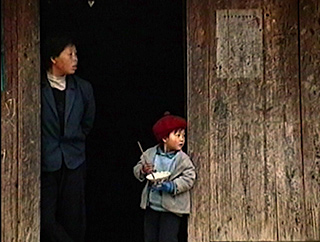What About China?
- USA, CHINA / 2022 / English / Color / DCP / 135 min
 Director, Script, Photography, Editing: Trinh T. Minh-ha
Director, Script, Photography, Editing: Trinh T. Minh-ha
Music: Wu Wei
Narration: Xiaolu Guo, Xiao Yue Shan, Yi Zhong, Trinh T. Minh-ha
Folk Singers: Cao Xiyun, Liz Liu, Ming Bo, Qin E
Incantation, Singing: Huan Cheng
Still Photography, Producer: Jean-Paul Bourdier
Source: Moongift Films
Today, thirty years later, the director reassembles Hi8 video footage she herself shot in southeastern China in 1993 and 1994. The traditional circular Hakka house is placed at the center of the image, then overlaid with ancient poems, songs, ink paintings, and the voices of multiple “selves” recounting autobiographies, poems, and philosophical musings. This unique montage of images and sounds evokes ample associations with the Chinese nation and its social transformations. With the concept of harmony at its core, the film probes the past, present, and future of Chinese society amidst the rapid urbanization of rural areas, the digitalization of everyday life, and the devastating effects of the pandemic. (HA)
[Director’s Statement] In the politics and ethics of representation, the challenge of speaking nearby (rather than merely “about”) takes on a new lease of life with each film made. To refuse the readymade of packaged specialized knowledge is to keep open that relation of infinity within the finite in filming, writing, and research. When one works in a nonknowing mode, one remains open to allowing things to come to oneself in an unexpected way. Ear, eye, and voice, for example, never duplicate one another. They interact in counterpoints, syncopations, off beats, and polyrhythms. As the base from which form is created and undone, rhythm determines both social and sensorial relationships. The play of hear and see constantly solicits the hearing eye and the seeing ear, and multivocality can be intimately experienced in its multisensory bodily diversity.
Drawing from footage shot mostly in 1993–94 in villages in eastern and southern China linked in common lore to the remote origins of the country’s civilizations, What About China? takes the notion of harmony in China as a site of creative manifestation.
In the film, harmony involves not only the way music fundamentally defines reality, or the way space structures daily life, but also the dynamic agents in the ongoing process of safeguarding the “roundness” of a world of social equity. Offering a journey into the wealth of China’s traditional architecture while exploring the hinterlands of self and other in their encounter, the film addresses the process of “harmonizing” rural China as part of the country’s Great Uprooting. It seeks to engage the viewer further by asking: What exactly is disappearing? And how?
 Trinh T. Minh-ha
Trinh T. Minh-haBorn in Vietnam, Trinh T. Minh-ha is a filmmaker, writer and music composer. Her feature-length films include Reassemblage (1982), Surname Viet Given Name Nam (1989), A Tale of Love (1995), The Fourth Dimension (2001), and Night Passage (2004). She has also published twelve books to date, including Woman, Native, Other: Writing Postcoloniality and Feminism (1989), When the Moon Waxes Red: Representation: Gender and Cultural Politics (1991), Cinema Interval (1999), Elsewhere Within Here: Immigration, Refugeeism and The Boundary Event (2010), Lovecidal: Walking with the Disappeared (2016), and Traveling in the Dark (2023). She was an International Competition juror at YIDFF ’91. Trinh is Distinguished Professor of The Graduate School at the University of California, Berkeley.
